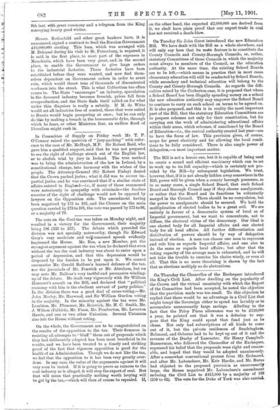On Tuesday Sir John Geist introduced the new Education Bill.
We have dealt with.the Bill as a whole elsewhere, and will only say here that its main feature is to constitute the County Councils and County-Borough Councils, or, rather, statutory Committees of those Councils in which the majority must always be members of the Council, as the education authority. At the same time, the existing School Boards are to be left,—which-means in practice that in most cases elementary education will still be conducted by School Boards, while secondary and technical education will belong to the County and County-Borough Councils. As regards the diffi- culties raised by the Cockerton case, it is proposed that where a School Board has been illegally spending money on a school the new education authority may empower the School Board to continue to carry on such school on terms to be agreed.on. It is also proposed, and this is in reality the most important part of the Bill, that the statutory Education Committees are to prepare schemes not only for their constitution, but for carrying out the work of administering educational affairs within their areas, which schemes, if sanctioned by the Board of Education—i.e., the central authority created last year—are to have the force of law. This provision gives, of course, scope for great elasticity and for allowing the local condi- tions to be fully considered. There is also ample power of delegation,—a most important matter.






































 Previous page
Previous page